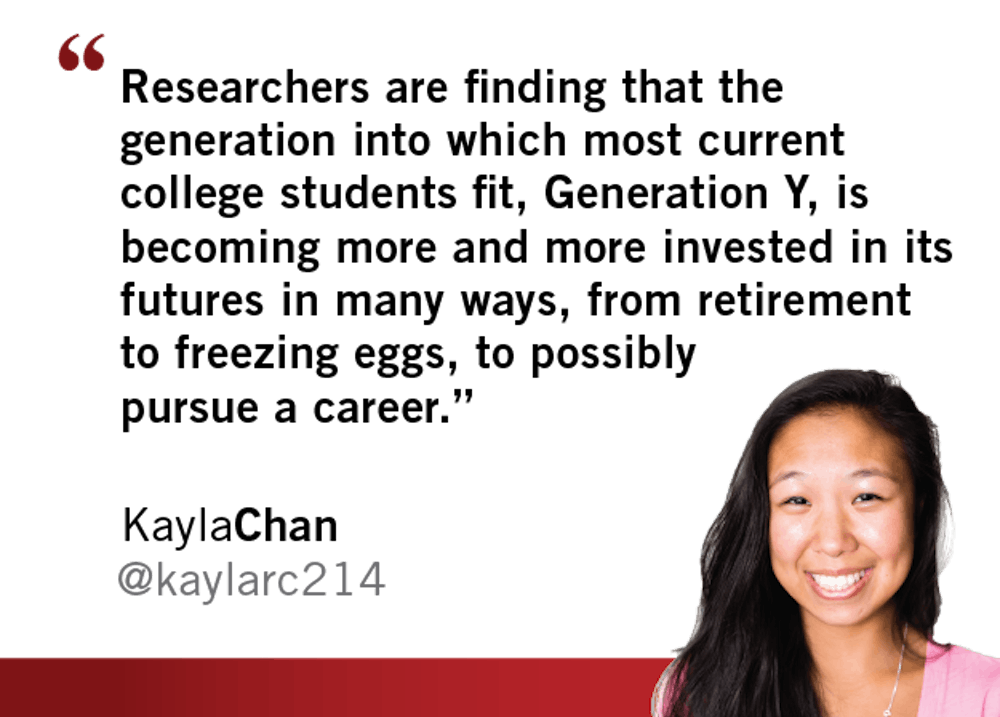Oct. 19 through Oct. 25 is National Save for Retirement Week! What may seem light-years away is not so far after all, and millennials, many of whom are now in their late 20s, are starting to think about the future in ways that previous generations have not. They are starting to think about health care, “wealth care” and other future planning, from real estate investments to wills.
Researchers are finding that the generation into which most current college students fit, Generation Y, is becoming more and more invested in its futures in many ways, from retirement to freezing eggs, to possibly pursue a career. The importance of all of this is actually being stressed. There is little doubt that millennials have grown up in difficult economic times, so they should be thinking about their futures sooner but at a lower intensity.
“A century ago, even counting the super-wealthy, (Stanford law professor Lawrence Friedman) thinks probably half of the population gave it a thought” Lily Rothman said in her article “The Last Will and Testament of a Millennial,” in which she defends why she has decided to write a will at 28. Many college students, like her, don’t have very much to our name other than what can be found in our meager bank accounts — maybe the beginnings of a financial portfolio, and whatever other personal junk we’d like to leave to our family and friends. That doesn’t mean that it’s silly for us to want to be able to decide where those things go in the event of a tragedy.
The increase in the number of young individuals who are contributing to 401k’s and drafting important plans like a will, is thought to be set on by the last recession. With the addition of student loans, car payments, and other common expenses, contributing to a retirement plan now is not always something that is plausible.
“According to these indicators — which include whether respondents have bank accounts, real estate, financial investments, and retirement accounts — most college-educated Gen-Yers own a variety of assets and are thus involved in important personal financial decisions (Figure 2),” the TIAA-CREF Institute found in a recent study on the Personal Finances of College-Educated Millennials. The Institute’s findings show that starting those security measures is still possible and often very rewarding.
The point is, because of the economic circumstances into which many millennials have been thrown, these serious, “future-planning” situations are more important and more serious than most realize. Most people are retiring after age 65 and if by midway through your career you have a family, your children’s college loans, mortgage payments and the likes, you won’t want to be contributing a hefty percentage of your annual income towards your retirement. However, “if you can start setting aside money at age 25, you’ll need to save only about 10 percent of your annual income to retire at 65,” Pat Regnier said.
This isn’t to say that at 21, fresh out of college, every millennial needs to draft a will indicating who their Mac should go to or eradicate nights out to the bar to contribute to a 401k. Still, it should be looming at the back of everyone’s minds as something they should start to think about if they have means to.
Reach the columnist at kayla.chan@asu.edu or follow her on Twitter @kaylarc214.
Editor’s note: The opinions presented in this column are the author’s and do not imply any endorsement from The State Press or its editors.
Want to join the conversation? Send an email to opiniondesk.statepress@gmail.com. Keep letters under 300 words and be sure to include your university affiliation. Anonymity will not be granted.
Like The State Press on Facebook and follow @statepress on Twitter.





